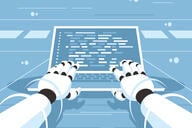You have /5 articles left.
Sign up for a free account or log in.
Just in case you’re in a rush, here’s a tl;dr money quote from an important new study of whether recent college graduates feel prepared to use information:
A large majority . . . believed they had transferred information skills from college for interpreting and applying search results (76%) and reflecting on the ways they learned best (74%). Yet, far fewer—less than a third (27%)—agreed that college had helped them develop the ability to formulate and ask questions of their own.
I figure you’re in a hurry because these graduates sure are. That’s part of the trouble: they’re faced with a whole host of information needs for their jobs, their lives, and for connecting with new communities and it’s a huge challenge.
What would we do without Project Information Literacy? This is hands-down the most important long-term, multi-institutional research project ever launched on how students use information for school and beyond. This week another report based on years of research has come out. This one looks in detail at how well students can use the things we hope they learn about information after they graduate.
There’s good news and bad news.
As the quote I opened with indicates, graduates feel pretty well prepared to make critical judgments about information sources and don’t just rely on the first thing that pops up. Of course not. This is real life, not a term paper due tomorrow. It’s good to hear that they feel their experiences in college have developed their ability to tell whether a source is worth paying attention to or not. Well done us.
The bad news is that they don’t feel well prepared to develop their own questions. This should trouble us all, because that’s a pretty major function of higher education and one of the most important kind of learning that can happen in an academic library.
Another less profound but still important good news/bad news finding: it seems we got across the message that scholarly sources are useful. Unfortunately three quarters of graduates reported having trouble finding affordable sources of information and half expressed frustration that the databases they used in their academic library are now inaccessible to them, along with course materials. MOOCs are not what they have in mind – a large majority say they don’t have time to sign up for massive online courses. But locking up this year’s lecture notes in a course management system renders up-to-date information unavailable to former students). If the solution is “go to the public library” – okay; in fact, about half do that. Altogether 70 percent report looking for information in books obtained from a variety of sources. But so much journal literature is virtually unavailable to those outside the walled gardens of academia.
I’m cheered to have further confirmation that there is a desire beyond academia for open educational resources and open access scholarship. But I’m frustrated that we haven’t fixed this problem. It makes little sense to instill in students deep respect for research and then tell them that it’s just for school or for people who can afford to shell out $35 for every article they might want to consult. This is just stupid, and we can change it.
One other finding that hit home for me: students describe struggling to develop a personal learning network that can help them keep up with new information. In addition to everyday learning – how to budget for groceries, how to cook their own food, how to do the things a grownup has to do – they have to learn how to communicate with older co-workers, how to develop their career (which may involve leaving their current job), and how to keep up with new developments in their field. We don’t give students much experience with finding and filtering new information as it develops. Instead, they do research for assignments (and sometimes with faculty) but may have no idea how to connect with people beyond the confines of a campus and a curriculum or how to monitor the ongoing conversations that will matter to them professionally. So often librarians’ efforts are geared to completing tasks, and so are our tools. We don’t typically help students identify the information streams where those articles they are retrieving get their start.
There’s so much more. I'm barely scratching the surface. This well-designed study involved a survey of 1,651 people who had graduated from one of ten colleges and universities between 2007 and 2012. In addition, interviews were held with 126 subjects to add depth to the findings. It’s the most ambitious of the Project Information Literacy studies and arguably the most important because there’s nothing else like it out there, save the project’s previous smaller-scale study. This adds a great deal of weight and depth to what we know about the ultimate ends of our information literacy efforts. As Alison Head, the study’s author, points out, data about students is abundant. Data about what happens after they graduate, not so much.
We all owe her a debt of gratitude that she’s helping to change that.

